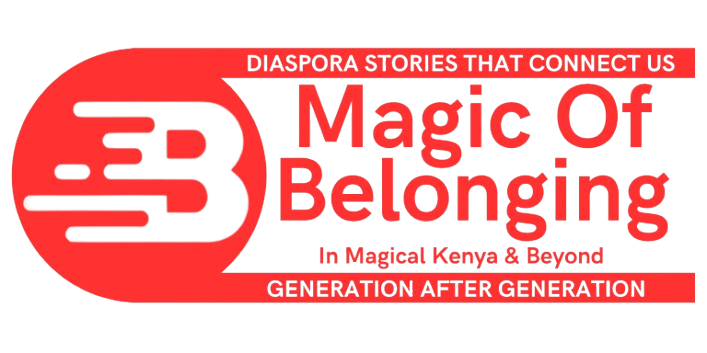Long before she ever stepped foot in a research lab, Kelly Ngigi was already gathering data—through feelings, silences, and the quiet negotiations that came with growing up between two worlds. Born in Nairobi but raised in the American Midwest, Kelly’s childhood was a balancing act, performed on the invisible tightrope stretched between cultures, languages, expectations—and the lingering question, “Where do I fully belong?”
Today, as a PhD candidate and developmental scientist at Penn State’s Family P.O.W.E.R. Lab, Kelly is returning to that question—but this time, not just for herself. She’s creating space for thousands of Kenyan-American youth who, like her, have long lived in the hyphen of identity, trying to stitch together what it means to be both Kenyan and American in a world that rarely makes room for the complexity of both.
A Hyphenated Life
Kelly didn’t choose to become a cultural translator—it was simply the role life gave her. At school, she mastered American idioms and independence. At home, she lived under the watchful eye of Kenyan traditions—elders first, family before self, speak when spoken to. While classmates went to therapy or talked back freely, Kelly was learning the silent resilience woven into the lives of many immigrant children: you carry your family with you—its dreams, its pride, its silence.
These early tensions would later bloom into inquiry. As she moved deeper into the field of human development, Kelly began to notice what wasn’t there: where were the studies on kids like her? The ones fluent in both American pop culture and Kikuyu proverbs? The ones who switched accents depending on who was listening? The ones trying to honor their parents’ sacrifices while also learning how to be fully seen in their American skin?
“I realized that our stories weren’t just underrepresented—they were invisible,” she recalls.
And so, she set out to change that.
Listening in a New Language
At the Family P.O.W.E.R. Lab—where relationships, emotions, and development are understood as a dance between family members—Kelly found a home for her questions. Guided by Family Systems Theory and inspired by Kenya’s harambee spirit (pulling together), she designed the first-ever study centered on Kenyan-American families in the U.S.—with a particular focus on adolescents.
Her study isn’t just another academic project. It’s a love letter to the children of the diaspora.
Using everything from online journaling communities to recorded family conversations over dinner, she’s gathering rich, intimate stories of how young people in Kenyan-American households navigate belonging, discipline, faith, identity, and mental health.
She calls it “cultural ambidexterity”—the ability of Kenyan-American youth to fluidly switch between expectations, languages, and worldviews. “They’re not just surviving in both cultures,” she says. “They’re synthesizing something new.”
Research as Remembering
Kelly’s work is a response to more than an academic gap—it’s a response to being overlooked by systems that lump Kenyan-Americans into generic categories. In school data, they’re just “Black.” In immigrant data, they’re often folded into “African.” In family studies, they’re erased entirely.
But in Kelly’s world, they are seen in all their specificity and brilliance.
Her study explores questions others have never thought to ask: How does harambee show up in parent-child relationships? What happens when silence is a form of love, but your therapist calls it avoidance? How do you talk about mental health when your community calls it being weak?
She listens not just as a researcher, but as someone who remembers. Who’s lived the balancing act. Who knows the stakes.
Shifting Systems from Within
Already, her work is sending ripples beyond the lab. Educators are rethinking how they interpret Kenyan-American students’ behavior. Therapists are learning to see cultural nuance in family conflict. Community organizations are building better programs rooted in identity rather than assimilation.
“My work is about remembering who we are,” she says. “Because when we remember, we can belong to ourselves. And when we belong to ourselves, we can belong anywhere.”
And perhaps most movingly, families who participate in her research often say the process itself is healing. “We’ve never talked like this before,” one parent admitted after a recorded dinner table conversation. Another teen said, “I didn’t know my parents had a reason for being so strict—I just thought they didn’t get me.”
Kelly’s work is teaching families to translate love between generations.
An Ongoing Return
Though Kelly lives and works in the U.S., Kenya remains an ever-present compass. Her research framework draws from Kenyan wisdom systems: the cooperative nature of jamii (community), the adaptability of agro-pastoralists facing droughts and floods, the emotional poise of sawa sawa, the delicate fractures of ugatuzi.
Like the Kenyan soil that cracks then blooms with each season, Kelly sees identity not as a fixed place but as something in motion—molded by both challenge and grace.
“My work is about remembering who we are,” she says. “Because when we remember, we can belong to ourselves. And when we belong to ourselves, we can belong anywhere.”
A Story Too Big for One Sentence
Ask Kelly where she’s from, and she might smile. Because the real answer can’t be wrapped in a location. It lives in every Kenyan-American child who’s ever interpreted for their parents at the DMV, then gone home to teach them how to use Wi-Fi. It lives in the quiet strength of mothers holding family histories in their hands. It lives in the dinner tables where accents mix and love speaks in many forms.
Kelly’s story—like the stories she now gathers—is one of building bridges. Between generations. Between nations. Between silence and voice.
And in that bridge, the magic of belonging is no longer a question.
It’s a promise.
The Review
Shadow Tactics: Blades of the Shogun
A wonderful serenity has taken possession of my entire soul, like these sweet mornings of spring which I enjoy with my whole heart. I am alone, and feel the charm of existence in this spot, which was created for the bliss of souls like mine.
PROS
- Good low light camera
- Water resistant
- Double the internal capacity
CONS
- Lacks clear upgrades
- Same design used for last three phones
- Battery life unimpressive
Review Breakdown
-
Design
-
Performance
-
Camera
-
Battery
-
Price





























